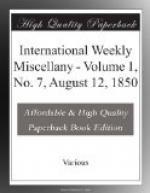John Randolph is the best subject for a biography, that our political experience has yet furnished. Who that remembers the long and slender man of iron, with his scarcely human scorn of nearly all things beyond his “old Dominion,” and his withering wit, never restrained by any pity, and his passion for destroying all fabrics of policy or reputation of which he was not himself the architect, but will read with anticipations of keen interest the announcement of a life of the eccentric yet great Virginian! Such a work, by the Hon. Hugh A. Garland, is in the press of the Appletons. We know little of Mr. Garland’s capacities in this way, but if his book prove not the most attractive in the historical literature of the year, the fault will not be in its subject.
* * * * *
The Scottish Booksellers have instituted a society for professional objects under the title of the “Edinburgh Booksellers’ Union.” In addition to business purposes, they propose to collect and preserve books and pamphlets written by or relating to booksellers, printers, engravers, or members of collateral professions,—rare editions of other works—and generally articles connected with parties belonging to the above professions, whether literary, professional, or personal.
* * * * *
D’Israeli abandons himself now-a-days entirely to politics. “The forehead high, and gleaming eye, and lip awry, of Benjamin D’Israeli,” sung once by Fraser are no longer seen before the title-pages of “Wondrous Tales,” but only before the Speaker. It is much referred to, that in the recent parliamentary commemoration of Sir Robert Peel, the Hebrew commoner kept silence; his long war of bitter sarcasm and reproach on the defunct statesman was too freshly remembered. Peel rarely exerted himself to more advantage than in his replies, to D’Israeli, all noticeable for subdued disdain, conscious patriotism, and argumentative completeness. For injustice experienced through life, the meritorious dead are in a measure revenged by the feelings of their accusers or detractors, when the latter retain the sensibility which the grave usually excites, and especially amid such a chorus of applause from all parties, and a whole people, as we have now in England for Sir Robert Peel—the only man in the Empire, except Wellington, who had a strictly personal authority.
* * * * *
Dr. Dickson, recently of the Medical Department of the New York University, and whose ill-health induced the resignation of the chair he held there, has returned to Charleston, and we observe that his professional and other friends in that city greeted him with a public dinner, on the 9th ult. Dr. Dickson we believe is one of the most classically elegant writers upon medical science in the United States. He ranks with Chapman and Oliver Wendell Holmes in the grace of his periods as well as in the thoroughness of his learning and the exactness and acuteness of his logic. Like Holmes, too, he is a poet, and, generally, a very accomplished litterateur. We regret the loss that New York sustains in his removal, but congratulate Charleston upon the recovery of one of the best known and most loved attractions of her society.




